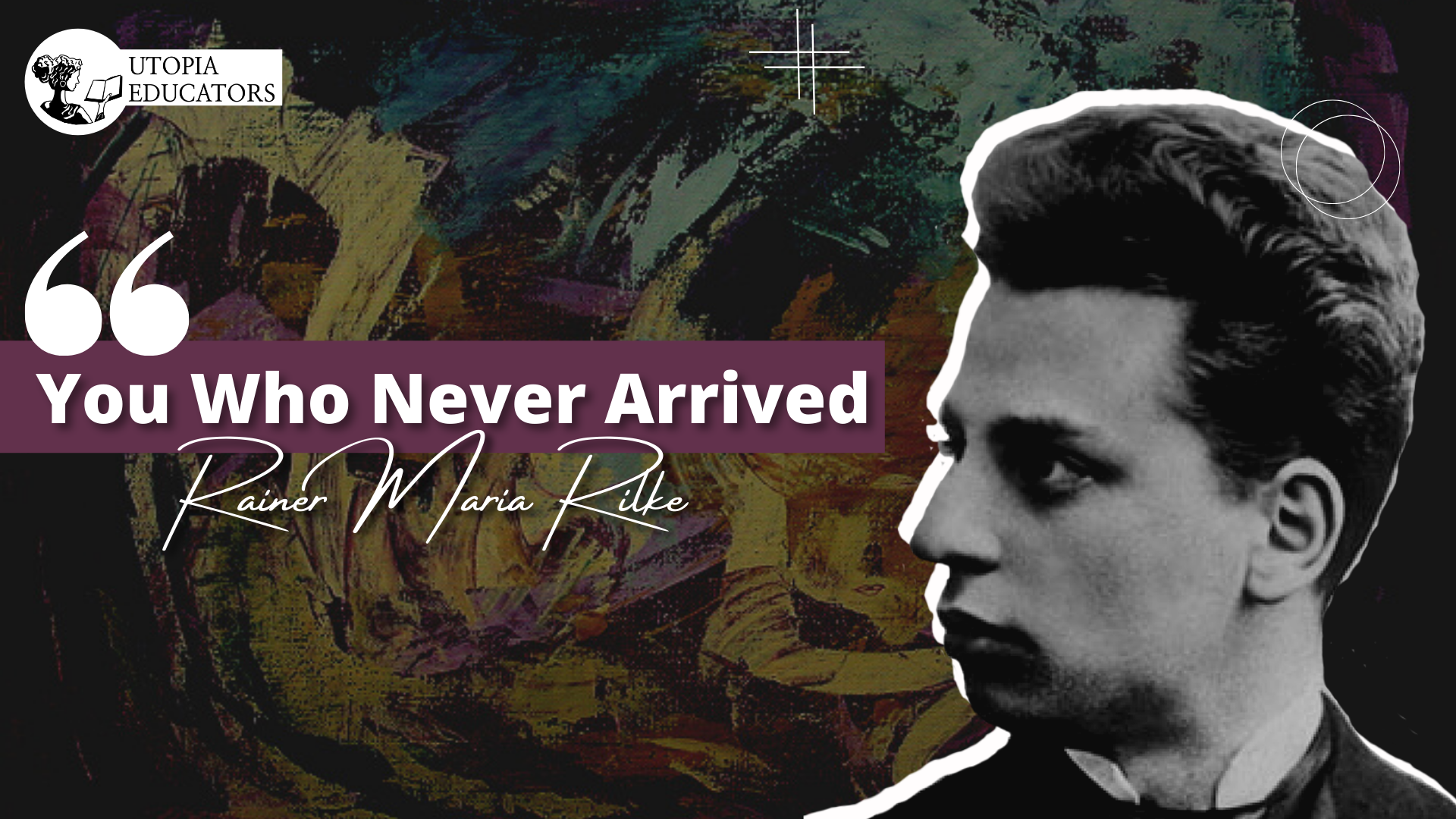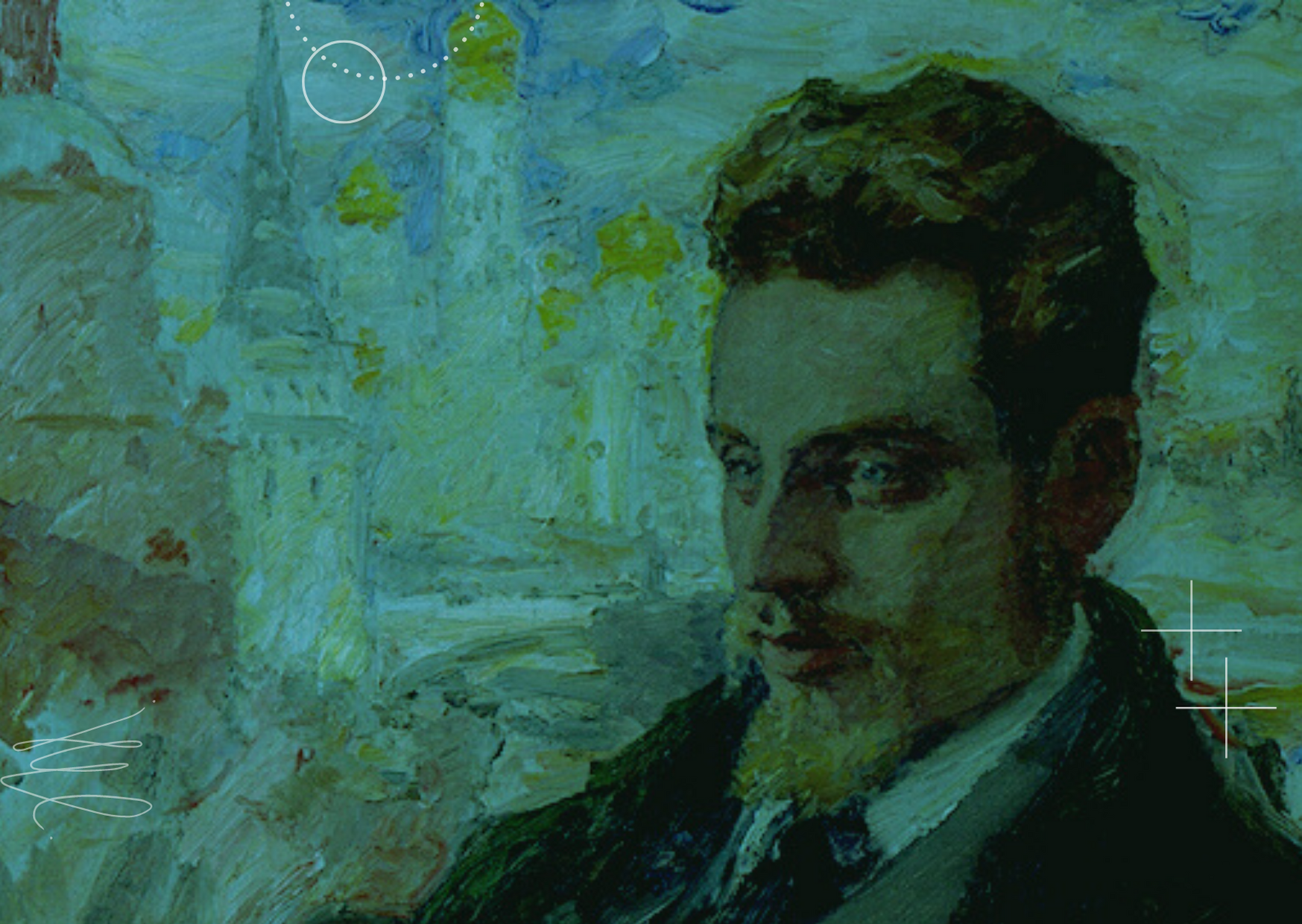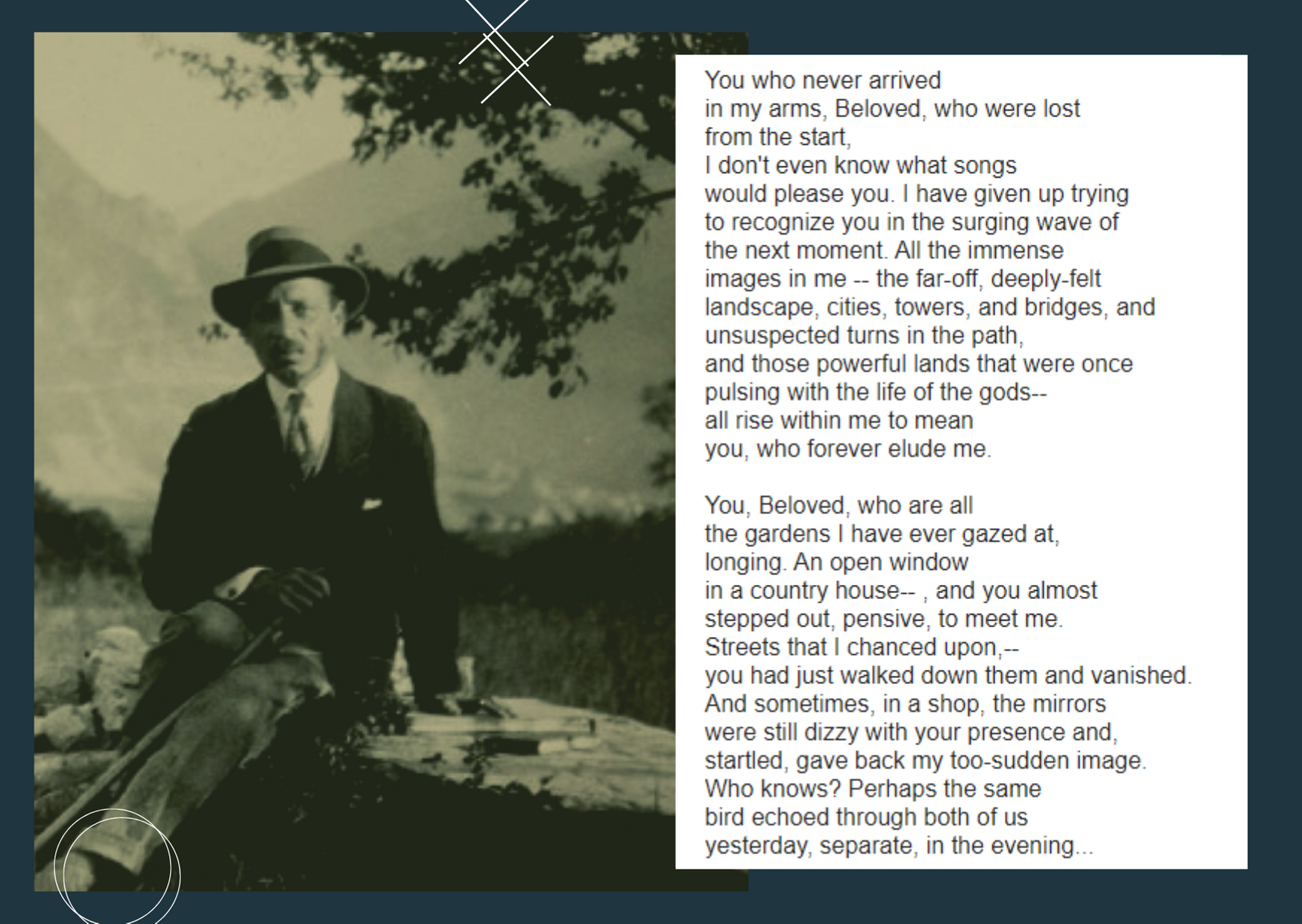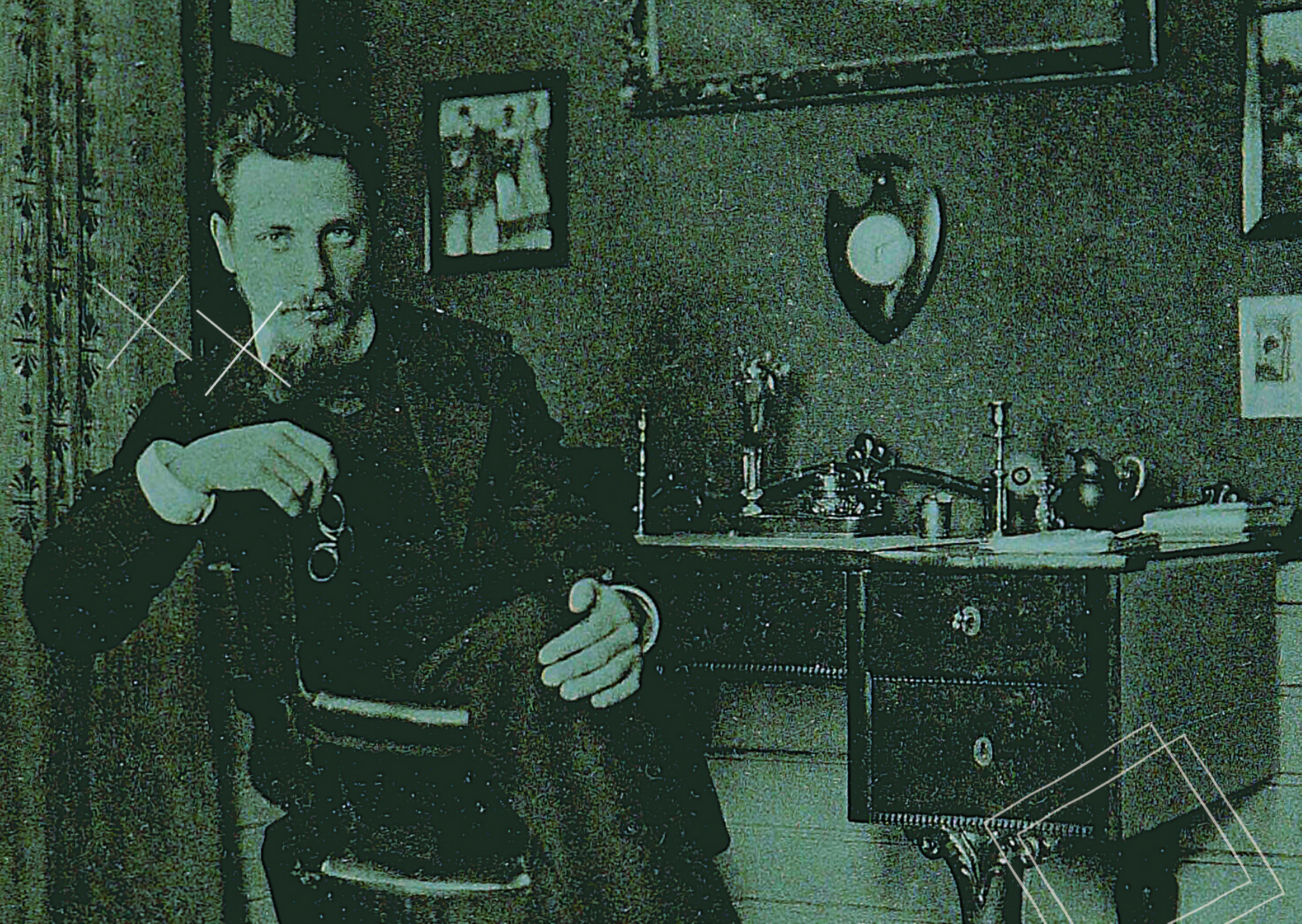You Who Never Arrived: Simply Rainer
You who never arrived is an unpublished fragment by Rainer(translated by Mitchell). In this poem, Rainer shares his personal outlook about how one can never really have the person they truly love.

Perhaps everything terrible is in its deepest being something helpless that wants help from us- Rainer Maria Rilke
Rainer: The Modern Mystic
Greatly recognized as one of the most passionate German poets of the nineteenth century, Rainer Maria Rilke, a Bohemian-Austrian writer and poet famous for his unique style and a completely different approach towards beauty, suffering, life and death. Born on December 4, 1875, Rilke was the only child of a German-talking family in Prague. The early years of Rilke's life were viewed as the time of great unrest. When Rilke was only 9, his mother left his father. One can always notice the effect of his childhood experiences recurring constantly throughout his most important works. With the help of his Uncle Rilke enrolled in Charles University, Prague as a student of literature. By that time he had already published his his first poetic work, Leben und Lieder. After this Rilke hardly ever stayed at one place, he liked to travel around and had an utter curiosity to see and the places and people he had read about. In 1897, he went to Russia with Salome, a trip which unfurled some of the most important events in his life. He found way to inner tranquil in his journey especially due to the richness of art and literature along the whole trip. Rainer met Leo Tolstoy whose influence is very evident in Das Buch vom lieben Gott und anderes. This marked the beginning of Rainer's very serious works.

Theme, Style and Whatnot !
The purpose of life is to be defeated by greater and greater things.- Rainer.
Rilke’s poems are sensitive and full of emotions. He only wanted one thing out of his poetry and that was to go beyond it. For him Art was what mattered the most in his life! His themes consisted of the inexpressible parts of people's life. Inspiring them with his intellectual, emotional topics, and a unique style of writing. The literature style generally used at Rilke's time was Romanticism and later modernism. The spiritual love between men and women was a constant and the most explored theme. He defined love as something infinite, for him the passion that is present in love must not satisfy the lover temporarily but it should remain within, building something eternal. In his many works he also wrote about his preoccupation with death and God, The tale of love and death of Cornet Christoph Rilke and Book of hours are the two best examples of it.
The Poem: You Who Never Arrived

You who never arrived is an unpublished fragment by Rainer(translated by Mitchell). In this poem, Rainer shares his personal outlook about how one can never really have the person they truly love. He talks about how his beloved lives within him but he can never meet her in real life. He finds her everywhere yet she eludes him. He expresses the fact that he longs for her but can never find her. He doesn't blame anyone and accepts his fate that his wish for meeting her will remain forever unfulfilled. In the end one can see that in his head he believes his beloved wish the same but every time she steps out to meet him, their fate interrupts and works against them, stealing away their moment and consequently he loses her again.
Staza-1
You who never arrived
in my arms, Beloved, who were lost
from the start,
I don't even know what songs
would please you. I have given up trying
to recognize you in the surging wave of
the next moment. All the immense
images in me -- the far-off, deeply-felt
landscape, cities, towers, and bridges, and
unsuspected turns in the path,
and those powerful lands that were once
pulsing with the life of the gods--
all rise within me to mean
you, who forever elude me.
Rilke commences the poem by addressing his lover, someone he has never met but still continues to desire to hold in his arms. He laments over his unfulfilled desire of finding her. The fact that he doesn’t know what songs would please her explains that he himself is unable to understand her as well as is unaware about her interests. He claims that he has given up trying to search and recognize her in every wave that passes and is yet to come. In the next line the Rainer expresses an elevated thought that everything within him and far off- landscapes, cities, towers, and bridges, and even the places one can’t reach pointing towards God’s own land, all these things rise give meaning his lover within him. Everything he is made up of is nothing but his beloved, who forever avoids him. Rainer tries to signify that his love is so pure and powerful that even without his lover's physical presence it has become something eternal and blissful. Rainer expresses an ethereal feeling that only the lovers can understand, language which is written and understood only in love.
Stanza-2
You, Beloved, who are all
the gardens I have ever gazed at,
longing. An open window
in a country house-- , and you almost
stepped out, pensive, to meet me.
Streets that I chanced upon,--
you had just walked down them and vanished.
And sometimes, in a shop, the mirrors
were still dizzy with your presence and,
startled, gave back my too-sudden image.
Who knows? Perhaps the same
bird echoed through both of us
yesterday, separate, in the evening...
In the second stanza the Rainer compares her with a garden he gazed at with longing but could never call his own. The comparison with the garden tells us how Rainer is trying to explain the nature of his beloved to be peaceful and heavenly, trying to provoke the feeling of inner satisfaction which is similar to that of gazing at a beautiful garden. He feels the same way when he thinks about his beloved. In the next line he envisages a situation with an open window of a country house and his lover too pensive to meet him, walking down the same street he had once walked upon but suddenly vanishes before she could meet him. Rainer is trying explain how fate has never been in their favor. The lines reveal that she might have had the same desire and was looking for him. Rainer further writes how he could see her reflection in the mirrors of shops before he could see himself. In the most beautiful manner he describes that his admiration and love for her has grown into divinity and now she has started living within him. The poet here reflects an image or a dream he has of togetherness. In the last lines of the poem the Rainer gracefully accepts his fate and injects in us an obvious assumption that they both were in love and were looking for each other as the same feeling echoed within them, sadly their fate only allowed them to stay separated.
Conclusion: eternally incomplete togetherness
We need, in love, to practice only this: letting each other go. For holding on comes easily; we do not need to learn it.―Rainer Maria Rilke
The poem, You Who Never Arrived, somewhere stands out for all those in love, and who lived their life separated from their lovers. In the poem the poet evinces the actual meaning of love, which requires draining reciprocity, acceptance, and doubtlessly a lot of courage . Rainer accepts his fate and at the same time continues to love her, for he now has realized that his beloved lives within him and so nothing really matters to him beyond the eternal truth that his beloved shall always remain in his heart. Even though they stay separated physically, their souls were knit together.

Rilke’s unique way of expressing his thoughts in his poems about love and the grief that comes along makes them exquisitely beautiful. We all know that the quality of a great poetry is its ability to make the reader feel even for the things they might have never experienced or felt in their lives; something that Rainer does so flawlessly with his verse and poetry.
“To love is good, too: love being difficult. For one human being to love another: that is perhaps the most difficult of all our tasks, the ultimate, the last test and proof, the work for which all other work is but preparation.”
― Rainer Maria Rilke
Sources:
1. https://www.poetryfoundation.org/poets/rainer-maria-rilke
2. https://poets.org/poet/rainer-maria-rilke
3.https://digitalcommons.iwu.edu/cgi/viewcontent.cgiarticle=1013&context=theatre_honproj
4. https://www.infoplease.com/encyclopedia/arts/bios/german-lit/rilke-rainer-maria
5. https://stephenmitchellbooks.com/translations-adaptations/the-selected-poetry-of-rainer-maria-rilke/

